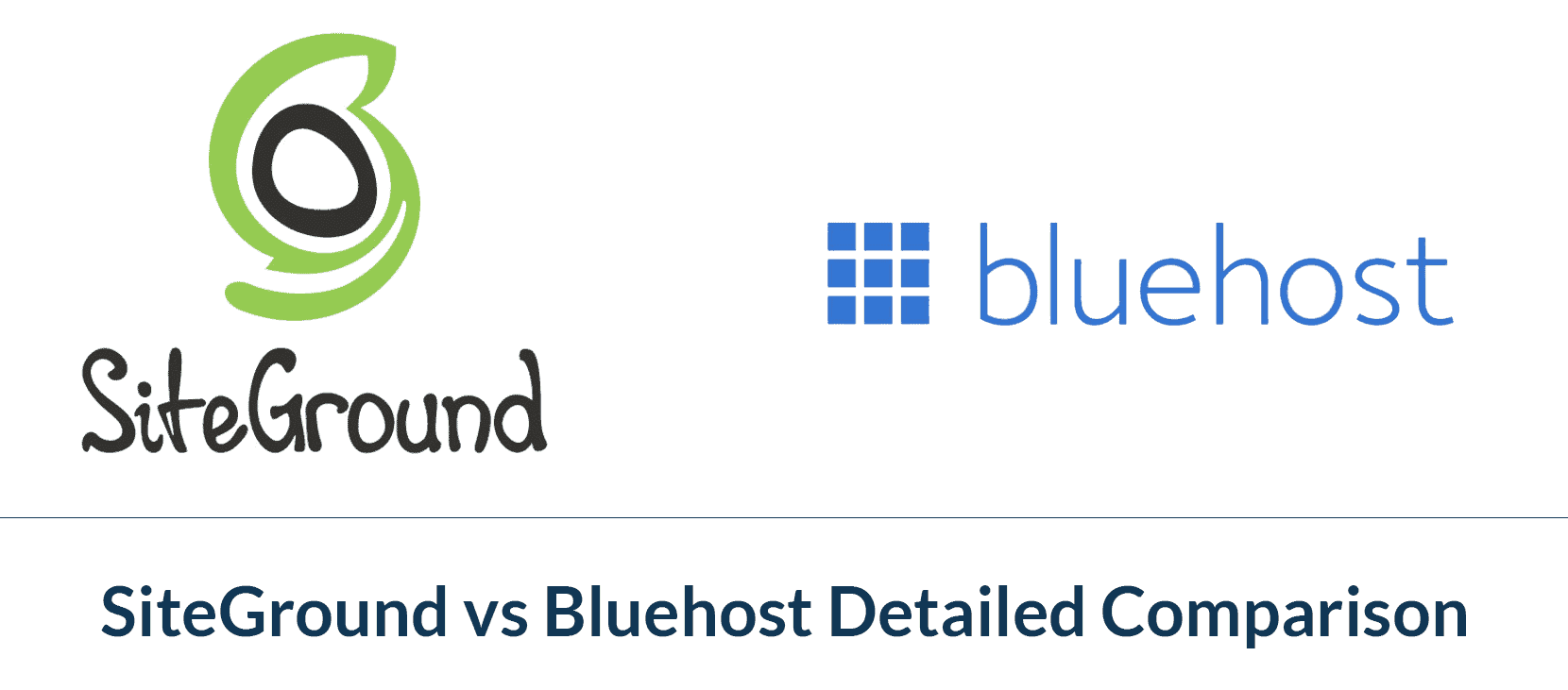Advertising disclosure
Hosting Canada is community-supported. We may earn a commission when you make a purchase through one of our links. Read Disclosure.
Siteground vs Bluehost
 Web hosting is critical for anyone who wants to own a website. Whether you’re a small business owner, eCommerce entrepreneur, a blogger, or someone else who wants to start a website, you’ll have to pay for someone to store and serve all your web files and content.
Web hosting is critical for anyone who wants to own a website. Whether you’re a small business owner, eCommerce entrepreneur, a blogger, or someone else who wants to start a website, you’ll have to pay for someone to store and serve all your web files and content.
As a beginner in the website world, many people want to find a free or cheap option for their hosting needs.
Unfortunately, free web hosting isn’t a thing, although many companies will market as such. While there are plenty of affordable web hosting options, in the end, most website owners get taken advantage of by bad providers and wish they had gone with a more reputable hosting provider like Siteground or Bluehost.
These two providers are both well-known in the web hosting industry. They’re reliable, fast, and affordable. However, they do have their key differences, pros, and cons which we’ll dive into below.
Table of Contents:
Short Introduction to Both
 Founded in Bulgaria in 2004, Siteground quickly expanded its operations and employee base. The company provides services to over 2 million domains all around the globe as it works with WordPress, WooCommerce, Drupal, Magento, and more. It has both offices and data centers around the world as well.
Founded in Bulgaria in 2004, Siteground quickly expanded its operations and employee base. The company provides services to over 2 million domains all around the globe as it works with WordPress, WooCommerce, Drupal, Magento, and more. It has both offices and data centers around the world as well.
Bluehost was created just one year earlier in Utah in 2003. Today, the company offers a variety of web hosting services in addition to marketing services. Just like its competitor, Bluehost hosts more than 2 million domains. Also similar to Siteground, Bluehost has various data centers dotted around the globe to serve different geographical areas.
Prices Compared
![]() The price of hosting can fluctuate greatly depending on what you’re looking for.
The price of hosting can fluctuate greatly depending on what you’re looking for.
For example, the amount you’ll pay for VPS hosting would be significantly different than dedicated hosting.
Siteground’s most basic plan starts at 3.99 € per month for shared hosting. The price includes a free SSL certificate, one website, free email, unlimited databases, 10 GB of space, 10,00 monthly visits, and much more. The company’s best-seller is one step up from the basic plan, and it costs 6.99 € per month.
This plan includes unlimited websites, 20 GB of space, 100,000 monthly visits, and more.
Bluehost offers shared hosting for as little as €2.55/mo. At that price, users can get a domain name for free for the first 12 months, a free SSL certificate, 1-click WordPress installation, and 24/7 customer support on one website.
To upgrade to the recommended plan, users will pay €4.72 per month and get several more features. These include unlimited websites, unlimited SSD storage, custom themes, free domain privacy, and plenty more.
Usability Compared
 Usability is one of the key factors that you need to consider when choosing a hosting service. If you find that you like one hosting company’s pricing structure and features, but you don’t find their platform easy to use, you shouldn’t go with that provider.
Usability is one of the key factors that you need to consider when choosing a hosting service. If you find that you like one hosting company’s pricing structure and features, but you don’t find their platform easy to use, you shouldn’t go with that provider.
For that reason, we’ve used both platforms and compiled our thoughts to let people know all about the usability of each.
Siteground is attractive to people who want flexibility as it provides a custom control panel. From there, everything you’ll want to do at the beginning is easy. For example, it provides 1-click WordPress installation, easy setup of regular backups, and more.
Overall, Siteground offers an intuitive, straightforward panel that allows you to do what you want quickly and easily.
Bluehost, on the other hand, uses a cPanel solution. Those who have used a cPanel previously will know that they’re user-friendly. While Bluehost has made its own customizations to the cPanel, it’s intuitive enough for anyone to quickly get comfortable with it.
The cPanel lets beginners install WordPress with one click, easily find creative themes, manage your website, and more.
Speed Compared
 Speed should always be one of the main priorities in choosing to host.
Speed should always be one of the main priorities in choosing to host.
If you’re a website owner, you want your site to load as fast as possible to provide the best user experience to your website visitors.
These speeds are in a large part determined by how close you are to a data center. Luckily, both Siteground and Bluehost have data centers all around the world meaning they both should have impressive load speeds.
Siteground is powered by Google Cloud which virtually guarantees fast speeds. Not only that, but Siteground has unique PHP technology to increase efficiency, custom caching technology, and additional integrations which all work to improve speeds. In our last Siteground review we found speeds ranging from 283ms to 333ms.
While Bluehost is one of the top contenders for best web hosting and while it has plenty of data centers to justify good speeds, they haven’t quite met the level of other competitors’ speeds.
Compared to Siteground with average speeds in the 300ms category range, Bluehost falls quite short. We’ve found the average load time to be 1.765 for Bluehost—something that can see some major improvement.
Uptime Compared
 Uptime goes hand-in-hand with loading speeds. Web hosting is all about getting your website loaded and served to a client that searches your website’s URL. However, the ability to get your website loaded depends on the web hosting provider running smoothly, and that doesn’t always happen.
Uptime goes hand-in-hand with loading speeds. Web hosting is all about getting your website loaded and served to a client that searches your website’s URL. However, the ability to get your website loaded depends on the web hosting provider running smoothly, and that doesn’t always happen.
Your website information is stored on physical servers somewhere, and as everyone knows, technology isn’t always reliable 100% of the time. Nonetheless, the closer we can get to 100% the greater uptime.
One place where Siteground shines is its uptime. This web hosting provider has been tested to have an impressive 99.99% uptime. As a Siteground user, you can be confident that you have a reliable hosting provider that will always serve you and your clients well.
Just shy of Siteground’s astonishing numbers, Bluehost reports a 99.74% uptime grade. While this may not be as impressive as Siteground’s score, it’s nothing to complain about. Anybody who is looking for a reliable web hosting provider can trust Bluehost to do the job well.
Features Compared
 As a website owner, you’re going to need a lot more than just a simple website that displays content. Likely, you’re going to want to store customers’ information like email addresses and potentially credit card information.
As a website owner, you’re going to need a lot more than just a simple website that displays content. Likely, you’re going to want to store customers’ information like email addresses and potentially credit card information.
In addition to potentially sensitive client information, you will have your own content that may need safeguarding or at the least, storing. For that reason, and plenty more, the features that come with web hosting providers are crucial to be aware of.
Siteground is known to have plenty of features to keep its clients happy. Even with the basic plan, users get eCommerce support, enhanced security features, managed WordPress, daily site backups, free CDN, unmetered web traffic, and out-of-the-box web caching for a better user experience.
If you choose a more premium tier, you’ll get better features like faster PHP, staging, priority support, and more.
With the basic plan, Bluehost provides several attractive features to its clients. Users get a free CDN, unlimited disk space, daily backups, free SSL, a free domain for one year, plus more. While Bluehost provides plenty of great features—like unlimited storage—the performance and service quality lack a bit.
Customer Support Compared
![]() As a customer purchasing a product or a service, you need to know that you’ll have support from the provider in case things go wrong. In the web hosting industry, it’s expected that things go wrong occasionally.
As a customer purchasing a product or a service, you need to know that you’ll have support from the provider in case things go wrong. In the web hosting industry, it’s expected that things go wrong occasionally.
Websites are complicated entities that rely on a plethora of factors to stay up and running smoothly.
When you host your website with someone, you want to be able to rely on their customer support to fix a problem as soon as it arises.
Siteground has a great customer support time that’s available 24/7 no matter the problem. The team is fast to pick up, respond, troubleshoot, and resolve your problem. All around the web hosting world, competitors look to Siteground as an example of how support teams should function.
While Bluehost claims to offer top-class customer support, the reality may be a tad different. Bluehost does provide 24/7 support to its clients, but the speed at which the team picks up an issue and resolves it doesn’t compare to that of Siteground.
Final Verdict – Siteground vs. Bluehost
As a website owner, you have to put in a lot of work to make sure it’s designed well, has all the important information it needs, is regularly updated with content, and much more. On top of how your website looks and functions, you need to make sure some of the more behind-the-scenes parts are handled well, like hosting.
The Winner - Siteground
Web hosting providers are critical pieces to the website puzzle.
If you want your website to load fast and stay online without crashes, you have to find the best web hosting provider for your site.
Between Siteground and Bluehost, Siteground takes the cake as the best hosting provider thanks to its top features, competitive pricing, and great customer support.










